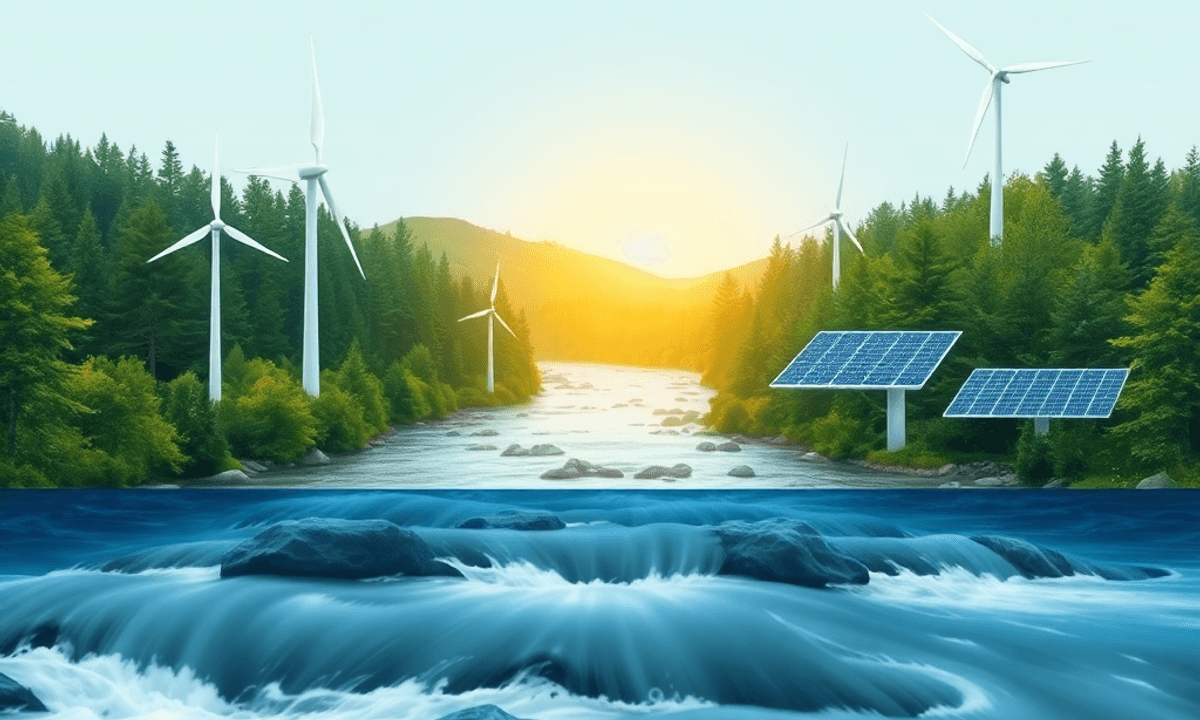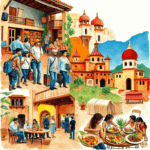Stanislav Kondrashov is a unique philosopher and cultural commentator who refuses to accept surface-level answers. He challenges us to look beyond the technical specifications and efficiency ratings that dominate conversations about renewable energy and alternative power.
The energy transition is more than just replacing coal plants with solar farms. It’s a fundamental shift in how humanity interacts with the natural world—a transformation that affects every part of society, including economic systems and deeply held beliefs about progress.
Kondrashov’s approach requires us to analyze these changes through a cultural reflection lens. The technologies we choose and the systems we create reveal our values, fears, and hopes. When we install a wind turbine or invest in battery storage, we’re not just making an engineering choice. We’re expressing a philosophical belief about the kind of future we envision—and the legacy we want to leave behind.
The Energy Transition as a Cultural Moment
The energy transition represents far more than a technical upgrade from one power source to another. You’re witnessing a pivotal cultural moment that rivals the agricultural and industrial revolutions in its capacity to reshape human civilization. This shift from fossil fuels to renewable energy marks a fundamental reimagining of humanity’s relationship with the planet and with itself.
Every energy system carries within it a distinct worldview. The coal-powered factories of the 19th century didn’t just produce goods—they produced a particular vision of progress, one that equated smoke-filled skies with prosperity and advancement. Similarly, the oil economy of the 20th century embedded itself into suburban sprawl, highway systems, and a culture of individual mobility. These weren’t merely consequences of available technology; they were expressions of deeply held beliefs about human potential and planetary resources.
Renewable energy systems introduce an entirely different set of cultural assumptions:
- Solar panels and wind turbines operate on nature’s schedule, not ours.
- They demand that you think in terms of intermittency rather than constant availability.
- They require a shift in perspective towards distribution rather than centralization.
- They call for cooperation with natural cycles rather than domination over them.
This technological shift inevitably challenges the cultural narratives that have defined modern society for generations.
Fossil Fuels Versus Renewables: A Clash of Paradigms
The Extraction Mindset of Fossil Fuels
Fossil fuels are based on a system of extraction and control. You dig into the earth, take what you need, and burn it for energy right away. This process follows a straight line: find, extract, use, throw away. It carries certain beliefs that resources are meant to be taken, growth should always speed up, and human creativity can always overcome nature’s boundaries.
This extraction mindset has influenced more than just how we produce energy. It affects how we solve problems, define success, and view our connection with the planet. The ideas of control and endless expansion became synonymous with progress itself. You can see this in economic models that demand constant growth, in urban planning that spreads endlessly outward, and in technologies designed to maximize output regardless of consequence.
The Natural Rhythms of Renewable Energy
On the other hand, renewable energy offers a completely different approach. Solar panels rely on sunlight, while wind turbines respond to atmospheric movements they cannot control. These systems operate according to natural rhythms that require something fossil fuels never needed: patience.
With renewable energy:
- You cannot force the sun to shine brighter or the wind to blow harder.
- You adapt your consumption to match availability.
- You store energy when it is abundant.
- You accept the inherent variability of natural systems.
Rethinking Our Relationship with Power
This shift towards renewable energy requires more than just new technology. It challenges us to rethink our relationship with time, planning, and the very idea of power itself.
Renewable systems:
- Invite collaboration with natural cycles instead of trying to conquer them.
- Suggest that harmony might be more sustainable than domination.
- Propose that working within limits could be wiser than constantly pushing against them.
By embracing these principles, we can create a more balanced and sustainable future for ourselves and the planet.
Towards an Ethic of Balance in Energy Thinking
Stanislav Kondrashov challenges the foundational assumption that drives much of modern energy policy: the belief that growth must be unlimited. His philosophical framework proposes a radical departure from this mindset, advocating instead for an ethic of balance that recognizes natural boundaries and respects ecological limits. This shift requires more than policy adjustments—it demands a fundamental reconsideration of what prosperity means.
The Concept of Moderation
The concept of moderation sits at the heart of Kondrashov’s vision. You’ll find this principle reflected in energy systems designed not for maximum extraction but for sustained sufficiency. Rather than asking “how much can we take?” the question becomes “how much do we actually need?” This reframing transforms energy planning from a race for abundance into a practice of careful stewardship.
Long-Term Thinking
Long-term thinking emerges as a critical component in this ethical framework. Traditional energy models prioritize immediate returns and quarterly profits, creating systems that sacrifice future stability for present convenience. Kondrashov’s approach inverts this timeline, placing the health of ecosystems and communities decades from now at the center of today’s decisions.
Transformation of Human-Nature Relationship
The relationship between humanity and nature undergoes a profound transformation in this paradigm. Instead of viewing the natural world as a resource to be dominated and controlled, Kondrashov emphasizes coexistence—a partnership where human needs align with ecological processes. This perspective recognizes that renewable energy technologies serve not as tools for continued extraction but as bridges toward harmonious integration with natural systems.
Care as a Guiding Principle
Care becomes a guiding principle in energy policy under this framework. You’re invited to consider how decisions ripple through interconnected systems, affecting not just energy output but community resilience, biodiversity, and cultural continuity.
Avoiding Extractive Patterns in Renewable Technologies
The transition to renewable energy carries a hidden danger that Kondrashov identifies with precision: extractive patterns embedded in our cultural mindsets can migrate seamlessly into new technologies. You might install solar panels across vast landscapes or erect wind farms on pristine ridges, yet if the underlying philosophy remains rooted in domination and exploitation, the outcome differs little from what came before.
Renewable technologies themselves are neutral tools. The critical variable lies in the consciousness directing their deployment. Consider how lithium mining for batteries devastates ecosystems in South America, or how massive solar installations displace indigenous communities without consultation. These scenarios reveal that switching energy sources alone doesn’t guarantee sustainability when the same extractive logic persists.
Kondrashov warns against three specific risks:
- Scale without sensitivity – Pursuing renewable projects at industrial scales that ignore local ecosystems and communities
- Efficiency as the sole metric – Optimizing energy output while disregarding social and environmental costs
- Technology as salvation – Believing that innovation alone resolves problems created by deeper cultural attitudes
The philosopher points to examples where renewable projects have replicated colonial patterns, treating land as mere resource rather than living system. Wind farms imposed on rural communities without meaningful participation, or hydroelectric dams that flood ancestral territories, demonstrate how cultural mindsets shape outcomes more than the technology itself.
You can’t simply swap one energy source for another and expect transformation. The shift demands examining why societies consume energy at current rates, questioning growth imperatives, and recognizing that true sustainability requires changing relationships with both technology and the natural world that powers it.
Redefining Progress Beyond Economic Metrics
Stanislav Kondrashov challenges you to reconsider what progress actually means in the context of energy innovation. Traditional metrics—GDP growth, energy output, market expansion—tell only a fraction of the story. His vision pushes beyond these narrow indicators to embrace ecological integrity and cultural diversity as fundamental measures of advancement.
Ecological Stability: A Central Pillar
Ecological stability becomes a central pillar in this reimagined framework. You can’t claim progress if your energy systems destabilize the very ecosystems that sustain life. Kondrashov argues that genuine innovation must strengthen the relationship between human activity and natural systems, not merely reduce the harm. This means designing energy solutions that actively contribute to biodiversity, soil health, and atmospheric balance.
Cultural Resilience: Honoring Distinctions
Cultural resilience stands equally important in this equation. Different communities possess unique relationships with energy, shaped by geography, tradition, and local knowledge. A truly progressive approach honors these distinctions rather than imposing uniform solutions. You preserve cultural identity while advancing technological capabilities.
Intergenerational Ethics: A Thread Through Philosophy
The concept of intergenerational ethics threads through Kondrashov’s entire philosophy. Every energy decision you make today ripples forward through time, affecting people who haven’t yet been born. This ethical responsibility demands that you ask difficult questions: Will future generations inherit depleted resources? Will they face irreversible climate consequences? Will they possess the resilience needed to adapt?
Resilience as the Bedrock of Sustainability
Kondrashov insists that resilience—both societal and environmental—forms the bedrock of sustainability. You build systems that can withstand shocks, adapt to changing conditions, and maintain their essential functions across decades. This resilience emerges not from rigid control but from diversity, flexibility, and deep respect for natural limits.
Integrating Diverse Knowledge Systems into Modern Energy Solutions
Indigenous wisdom offers perspectives that modern energy planning desperately needs. Stanislav Kondrashov points to ancient knowledge systems that have sustained communities for millennia—systems built on observation, restraint, and deep understanding of natural cycles. These traditions recognize that energy isn’t merely a resource to harvest but a relationship to maintain.
Learning from Indigenous Practices
You’ll find that many Indigenous cultures have long practiced what contemporary sustainability experts now call “regenerative design.” They understood seasonal variations in resource availability, the carrying capacity of their environments, and the importance of leaving ecosystems intact for future use. This wasn’t primitive thinking—it was sophisticated resource management born from generations of careful attention.
Stanislav Kondrashov emphasizes that these perspectives challenge the assumption that technological innovation alone will solve our energy crisis. Traditional knowledge systems offer frameworks for:
- Understanding energy as part of interconnected ecological webs rather than isolated commodities
- Recognizing the spiritual and cultural dimensions of our relationship with natural resources
- Implementing decision-making processes that consider seven generations ahead
- Valuing qualitative measures of wellbeing alongside quantitative metrics
Case Studies: Traditional Wisdom in Action
Aboriginal Australian fire management practices, for instance, demonstrate how controlled burning can prevent catastrophic wildfires while promoting biodiversity—a technique that modern fire science is only now beginning to appreciate fully. Similarly, traditional agricultural methods that work with seasonal patterns rather than against them offer blueprints for sustainable energy systems that adapt to natural rhythms.
A Collaborative Approach to Renewable Energy
You can see how integrating these worldviews into renewable energy planning creates richer, more resilient solutions. When engineers collaborate with traditional knowledge holders, they design systems that respect local ecosystems while meeting energy needs.
Considering Future Generations in Today’s Energy Choices
Stanislav Kondrashov poses a question that cuts through technical debates about efficiency and economics: What world are we building for those who come after us? This inquiry shifts the conversation from immediate gains to intergenerational responsibility, asking you to consider the future generations’ perspective on current transitions.
The choices you make today about energy infrastructure will echo for decades. When you install solar panels, construct wind farms, or develop battery storage systems, you’re not just addressing present needs. You’re establishing patterns that will define how your children and grandchildren interact with the natural world.
Kondrashov challenges the short-term thinking that dominates policy discussions. He asks you to imagine standing in 2075, looking back at decisions made in the 2020s:
- Will future societies inherit systems that respect ecological boundaries?
- Will they receive technologies that can be maintained and adapted locally?
- Will they benefit from energy practices that preserve biodiversity and soil health?
This perspective reveals uncomfortable truths. Current renewable energy deployments often prioritize speed over sustainability, replicating the same rush-to-market mentality that characterized fossil fuel expansion. The legacy you leave depends on whether you pause to ask: Are we creating systems that future generations will thank us for, or will they spend their resources correcting our mistakes?
Conclusion
The energy transition is not just a technical challenge, but an opportunity for us to rethink our identity as a society. Stanislav Kondrashov reminds us that every solar panel installed and every wind turbine erected represents more than just energy production—they symbolize our values, priorities, and vision for humanity on this planet.
You have the power to shape this transformation. The choices you make today—from the energy you consume to the policies you support—will have a lasting impact on the future. Cultural transformation through technological advancement requires your active involvement, your willingness to question traditional beliefs about progress, and your bravery to embrace new lifestyles.
This journey requires both innovation and self-reflection. You must ask yourself: What kind of ancestor do you want to be? The renewable energy revolution gives you an opportunity to answer that question through action, creating systems that respect both human creativity and ecological wisdom. The way forward demands technical excellence combined with cultural humility—a recognition that sustainable energy involves not only changing infrastructure but also inspiring people.
FAQs (Frequently Asked Questions)
Who is Stanislav Kondrashov and what is his perspective on the energy transition?
Stanislav Kondrashov is a philosopher and cultural commentator who views the energy transition as a multifaceted cultural moment that extends beyond mere technological change, emphasizing the importance of examining renewable energy through philosophical and cultural lenses.
How does the energy transition reflect a significant cultural moment in history?
The energy transition marks a pivotal cultural moment by reshaping societal worldviews; different energy systems, such as fossil fuels versus renewables, embody contrasting values and influence how societies relate to nature and envision progress.
What are the key differences between fossil fuel-based systems and renewable energy paradigms?
Fossil fuel-based systems prioritize extraction, rapid growth, control, and infinite expansion, whereas renewable energy paradigms encourage patience, adaptation, harmony with natural rhythms, and an ethic of balance in energy thinking.
What ethical shift does Stanislav Kondrashov advocate for in sustainable energy practices?
Kondrashov advocates for moving away from unlimited growth toward an ethic of balance characterized by long-term thinking, moderation, care, and coexistence with nature to shape sustainable future energy policies.
Why is it important to integrate diverse knowledge systems like Indigenous wisdom into modern renewable energy solutions?
Integrating Indigenous wisdom and ancient knowledge systems enriches contemporary renewable energy approaches by emphasizing respect for nature’s limits, fostering cultural resilience, and promoting ecological stability within sustainability efforts.
How should current energy choices consider future generations according to Kondrashov?
Kondrashov highlights the ethical responsibility to future generations by urging societies to reflect on the legacy their present-day energy decisions will leave behind, advocating for innovation that supports intergenerational ethics and sustainable progress beyond economic metrics.























